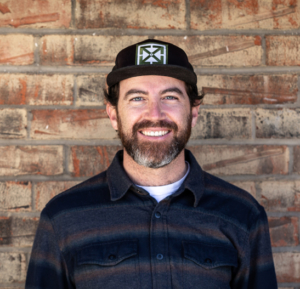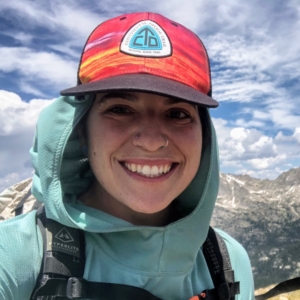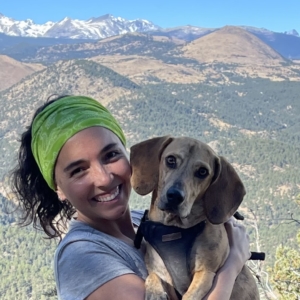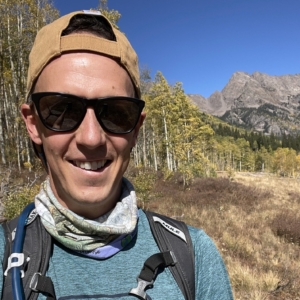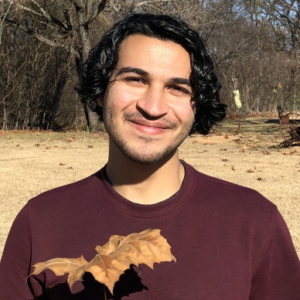“I was lucky to experience many educational and recreational opportunities on public lands from a young age, but I didn’t really realize how unique this was until later. Now I recognize that some countries—and even some states, for that matter—don’t have that much public land available for their people. We’re really fortunate to live in the West, where we have an abundance of public lands that are so beautiful, and in many ways already protected.
Now as the owner of Durango Outdoor Exchange, I can say with confidence that if we didn’t have healthy public lands, we wouldn’t have a business. A majority of people who buy used gear from us are using that gear on public lands. Public lands draw significant tourism, because they guarantee that you can come here and experience a wilderness setting without having to pay a private landowner.
Public lands are some of the best economic drivers we have in our region, and it’s so important to embrace and protect those public lands and give them the respect they deserve. So much of our way of life depends on it.”
“I didn’t grow up hiking or camping. The first time I slept outside, I was sandwiched between four friends in a Wal-mart tent in the foothills of Appalachia. The second time, I was in Colorado. There was something special about the public lands here. It was easy to fall in love with the grandeur of the granite, the shimmering spread of the night sky. The next day, I summited my first mountain and cried on the descent, scooting down the loose rock on my butt and swearing I would never do it again.
I’ve always struggled with my mental health, and over the next few years it seriously faltered. So I climbed another mountain. Then another. I began to live for the moments on the jagged ridges when I could look down and see the shapes of the world beneath me, and stake everything on my four trusty limbs gripping the rock. I flexed my courage like a muscle. I gathered strength and took it home with me, and slowly assembled the pieces of a happy life.
Public lands have taught me two things: how small and inconsequential I am in the context of the universe, and how significant I am to the world around me. I don’t know who I would be if I hadn’t found public lands. I think it would be harder to find pure unbridled joy, and harder to feel like myself.
Yet I know I wouldn’t have had these experiences if it weren’t for privileges I hold, such as owning a car. As every climate advocate knows, driving to the mountains on the weekends comes at a cost to our climate, and isn’t accessible for many people. As Transportation Advocate, my job is to figure out better ways to connect people to places, including our public lands. I work towards a Colorado where anyone can hop on a bus and roam our wild forests, where everyone has the opportunity to find the joy I discovered through public lands.”
“One Saturday last year, I decided that I wanted to climb my first fourteener. The next day, I left at 4:30 in the morning, alone, and started hiking up Mt. Bierstadt while it was still dark. I was scared when I got to the rocky part at the top, but I told myself, ‘I’m already here. I can do this.’ I found the strength within myself to get to the top. I was so grateful to have access to this place on public lands, that it’s beautiful, safe, and clean. For me, it was a reset on a spiritual level, and a way to nurture my inner child.
Growing up in Colombia, my parents tried to take us out of the city as often as they could to connect with nature and each other. It was a big part of how I found peace as a kid, but when we moved to the United States that changed. We still loved celebrating birthdays and events in the parks, but my parents were both working two jobs—there wasn’t time to go out on adventures. When I got to college, people were talking about hiking and skiing, and I just didn’t know what any of those things were. The first time I went on a hike, I was super nervous. But once I realized that all I needed was shoes, shorts, and water, I found it so refreshing and empowering.
I moved to Colorado looking for more connection with nature, and now I love doing everything from short hikes near Denver with my dog Tommy to big adventures like Mt. Bierstadt. I think we need to support initiatives that get kids out on public lands and teach them how to prepare. Guidance helps alleviate the anxiety around the unknown like I felt at first and teaches us to respect these beautiful places. We need to build bridges for all people to connect to the movement for public lands.”
“Whether it’s fishing in our state’s rivers, hiking through our beautiful mountain ranges, or skiing in the backcountry, I count myself so lucky to have Colorado’s public lands right out my back door. They are the scenes of so many childhood memories and now a peaceful refuge from the hectic life of being a State Representative. They have played a role in helping me discover how proud I was—and am— to call this part of our state home. They are not only a cherished natural resource that reflect the beauty of the mountain west, but a major driver behind the vitality of our state for our current and future generations.
I hope everybody here in Colorado feels a sense of agency and shared responsibility towards protecting these natural assets. That’s why I’m proud to continue Colorado Public Lands Day and play a role in preserving Colorado’s beauty. I want to hear from constituents directly about what’s most important to them when it comes to caring for our public lands so that we can continue to pass legislation that advances our conservation efforts. And I hope to help inspire a future generation of leadership who feels responsible for the health of our public lands and continues to steward them.”
“Growing up, I never felt like the outdoors or public lands existed for me. Honestly, I didn’t feel like I belonged in that culture. Later in life, when I took up climbing in the gym (on a total whim) and cycling as a way of getting around, I stumbled upon the activities that would later lead me to public lands. Taking myself outdoors has given me the chance to form amazing relationships with like-minded people.
Yet there still aren’t many people who look like me on public lands. Starting out, I felt like I had to prove myself, more so than the average newbie. Being new to the space and looking different than everyone else had me extra careful to do everything right. For a long time, that dragged down my experience. I’ve ultimately realized that there’s a lifetime of exploring out there, and I can make meaning of it in my own way. That’s what I remember when I feel like I don’t belong.
Representation matters. There are people like me who don’t even know that this world is out there for them. That’s why it’s always encouraging to see people out there who look like me. Going even further than that is crucial; the conversation around public lands must move beyond inclusivity and actually become antiracist. This means dismantling systemic racism in outdoor spaces, starting with recognizing the history of the lands we live and recreate on. When you understand that the U.S. government stole this land from Indigenous people, you can connect the dots to see that our legacy of racism and exclusion hasn’t disappeared. Public lands are by design in proximity to places where the dominant group lives. Plus, if you miss out on the intergenerational transmission of wealth, equipment, and knowledge that it takes to do many outdoor activities, that’s a huge barrier. Fighting systemic racism is one of the hardest problems we work on as a conservation organization, and there’s no one catch-all solution, but moving forward starts with recognizing the impacts of the past.”



